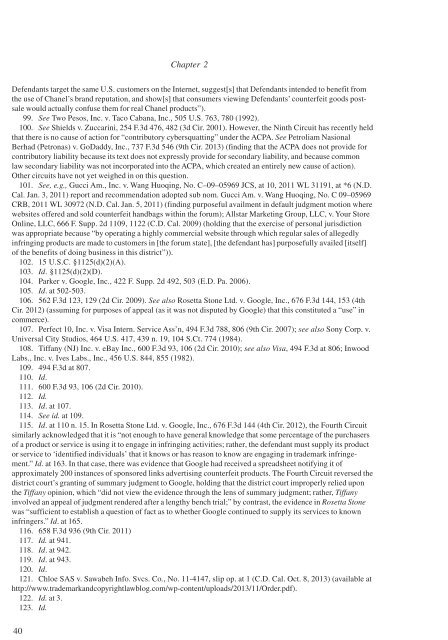1oz61wa
1oz61wa
1oz61wa
You also want an ePaper? Increase the reach of your titles
YUMPU automatically turns print PDFs into web optimized ePapers that Google loves.
Chapter 2<br />
Defendants target the same U.S. customers on the Internet, suggest[s] that Defendants intended to benefit from<br />
the use of Chanel’s brand reputation, and show[s] that consumers viewing Defendants’ counterfeit goods postsale<br />
would actually confuse them for real Chanel products”).<br />
99. See Two Pesos, Inc. v. Taco Cabana, Inc., 505 U.S. 763, 780 (1992).<br />
100. See Shields v. Zuccarini, 254 F.3d 476, 482 (3d Cir. 2001). However, the Ninth Circuit has recently held<br />
that there is no cause of action for “contributory cybersquatting” under the ACPA. See Petroliam Nasional<br />
Berhad (Petronas) v. GoDaddy, Inc., 737 F.3d 546 (9th Cir. 2013) (finding that the ACPA does not provide for<br />
contributory liability because its text does not expressly provide for secondary liability, and because common<br />
law secondary liability was not incorporated into the ACPA, which created an entirely new cause of action).<br />
Other circuits have not yet weighed in on this question.<br />
101. See, e.g., Gucci Am., Inc. v. Wang Huoqing, No. C–09–05969 JCS, at 10, 2011 WL 31191, at *6 (N.D.<br />
Cal. Jan. 3, 2011) report and recommendation adopted sub nom. Gucci Am. v. Wang Huoqing, No. C 09–05969<br />
CRB, 2011 WL 30972 (N.D. Cal. Jan. 5, 2011) (finding purposeful availment in default judgment motion where<br />
websites offered and sold counterfeit handbags within the forum); Allstar Marketing Group, LLC, v. Your Store<br />
Online, LLC, 666 F. Supp. 2d 1109, 1122 (C.D. Cal. 2009) (holding that the exercise of personal jurisdiction<br />
was appropriate because “by operating a highly commercial website through which regular sales of allegedly<br />
infringing products are made to customers in [the forum state], [the defendant has] purposefully availed [itself]<br />
of the benefits of doing business in this district”)).<br />
102. 15 U.S.C. §1125(d)(2)(A).<br />
103. Id. §1125(d)(2)(D).<br />
104. Parker v. Google, Inc., 422 F. Supp. 2d 492, 503 (E.D. Pa. 2006).<br />
105. Id. at 502-503.<br />
106. 562 F.3d 123, 129 (2d Cir. 2009). See also Rosetta Stone Ltd. v. Google, Inc., 676 F.3d 144, 153 (4th<br />
Cir. 2012) (assuming for purposes of appeal (as it was not disputed by Google) that this constituted a “use” in<br />
commerce).<br />
107. Perfect 10, Inc. v. Visa Intern. Service Ass’n, 494 F.3d 788, 806 (9th Cir. 2007); see also Sony Corp. v.<br />
Universal City Studios, 464 U.S. 417, 439 n. 19, 104 S.Ct. 774 (1984).<br />
108. Tiffany (NJ) Inc. v. eBay Inc., 600 F.3d 93, 106 (2d Cir. 2010); see also Visa, 494 F.3d at 806; Inwood<br />
Labs., Inc. v. Ives Labs., Inc., 456 U.S. 844, 855 (1982).<br />
109. 494 F.3d at 807.<br />
110. Id.<br />
111. 600 F.3d 93, 106 (2d Cir. 2010).<br />
112. Id.<br />
113. Id. at 107.<br />
114. See id. at 109.<br />
115. Id. at 110 n. 15. In Rosetta Stone Ltd. v. Google, Inc., 676 F.3d 144 (4th Cir. 2012), the Fourth Circuit<br />
similarly acknowledged that it is “not enough to have general knowledge that some percentage of the purchasers<br />
of a product or service is using it to engage in infringing activities; rather, the defendant must supply its product<br />
or service to ‘identified individuals’ that it knows or has reason to know are engaging in trademark infringement.”<br />
Id. at 163. In that case, there was evidence that Google had received a spreadsheet notifying it of<br />
approximately 200 instances of sponsored links advertising counterfeit products. The Fourth Circuit reversed the<br />
district court’s granting of summary judgment to Google, holding that the district court improperly relied upon<br />
the Tiffany opinion, which “did not view the evidence through the lens of summary judgment; rather, Tiffany<br />
involved an appeal of judgment rendered after a lengthy bench trial;” by contrast, the evidence in Rosetta Stone<br />
was “sufficient to establish a question of fact as to whether Google continued to supply its services to known<br />
infringers.” Id. at 165.<br />
116. 658 F.3d 936 (9th Cir. 2011)<br />
117. Id. at 941.<br />
118. Id. at 942.<br />
119. Id. at 943.<br />
120. Id.<br />
121. Chloe SAS v. Sawabeh Info. Svcs. Co., No. 11-4147, slip op. at 1 (C.D. Cal. Oct. 8, 2013) (available at<br />
http://www.trademarkandcopyrightlawblog.com/wp-content/uploads/2013/11/Order.pdf).<br />
122. Id. at 3.<br />
123. Id.<br />
40


